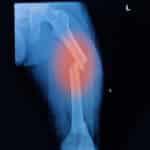Decades of experience representing patients
When patients are prescribed medicine by their doctors, they put trust in pharmaceutical companies to design and manufacture safe drugs, conduct proper medical research, and warn of known serious side effects. But far too often drug companies fall short, selling products that seriously injure patients. That is where Seeger Weiss comes in. We routinely represent patients in their time of need because our attorneys know that, to our clients, their case is the most important thing happening in their life.
Seeger Weiss lawyers bring a wealth of knowledge and experience, having helmed some of the most consequential drug injury lawsuits and obtaining groundbreaking verdicts and settlements.* Our attorneys served at the forefront of the pioneering Vioxx Products Liability Litigation against Merck over claims the company’s arthritis drug caused heart attacks and strokes, securing a $4.85 billion settlement. In another litigation involving similar pain medications, Bextra and Celebrex, our firm helped negotiate an $894 million settlement.
Additionally, founding partner Chris Seeger helped negotiate a $26 billion global settlement with Johnson & Johnson and the “Big Three” drug distributors AmerisourceBergen, Cardinal Health, and McKesson on behalf of over 3,000 communities impacted by the opioid crisis. Seeger Weiss has regularly been appointed by judges to lead pharmaceutical litigation, and it has experience ranging from developing and trying these cases in front of juries to negotiating major settlements.
Today, Seeger Weiss continues its storied history representing plaintiffs in drug injury lawsuits. Partner Parvin Aminolroaya serves as co-lead counsel in Elmiron (Pentosan Polysulfate Sodium) Products Liability Litigation, in which women allege the drug caused a unique type of ocular damage called pigmentary maculopathy. Additionally, partner Chris Seeger is co-lead counsel in the Proton Pump Inhibitor Products Liability Litigation, which alleges popular PPI drugs such as Nexium and Prilosec can cause kidney damage.
*Prior results do not guarantee or predict a similar outcome with respect to any future matter.
What is a Drug?
The FDA has a Center for Drug Evaluation and Research (“CDER”) that evaluates the safety of new drugs. Drugs are defined broadly by the FDA and CDER, and include:
- Prescription Drugs – Drugs prescribed by a doctor.
- Over-the-Counter Drugs – Drugs not requiring a prescription.
- Generic Drugs – These include both prescription and over the counter drugs. They are drugs that are formulated and perform the same way as brand name drugs.
- Miscellaneous Drugs – Toothpaste, dandruff shampoo, antiperspirant, and sunscreen are also regulated by the FDA.
Types of Drugs and Injuries
A wide range of prescription and over-the-counter drugs have caused injuries after approval by the FDA, and lawsuits have resulted. Examples of some of these drugs include the following:
- Elmiron – This is an interstitial cystitis drug found to cause a unique type of ocular damage, pigmentary maculopathy, in as many as 25% of long-term users. Hundreds of lawsuits are filed in Federal court.
- Prilosec – This is a medication for chronic heartburn, and it was found that long term use could lead to bone fractures, kidney injury and disease, intestinal infections, and dementia. Several lawsuits are pending in multidistrict litigation.
- Uloric – This is a medication used to treat gout, an inflammatory condition that happens when blood levels of uric acid are high. Uloric has been linked to an increased risk of cardiac death due to heart attack and stroke. Although the FDA required a black box safety warning for Uloric, which is the most severe FDA warning, the agency did not withdraw the drug from the market.
- Valsartan – This medication is used to treat high blood pressure, and due to contamination from carcinogenic chemicals, it caused liver failure, liver tumors and other types of cancer. Multiple manufacturers whose drugs were formulated in India and China, faced lawsuits for contamination that caused cancer.
Drug Injury Laws and Regulations
State Laws
Product Liability Laws
Lawsuits claiming injury because of prescription or over-the-counter drug use are generally brought as product liability cases, and sometimes as class actions. State laws vary so it is important to be familiar with the laws in your state to determine whether you have a viable claim.
Under most state laws, you could file a drug injury claim based upon the following theories:
Manufacturing Defects
- The Drug Was Formulated Improperly or Contaminated During the Manufacturing Process
- The Defect Must be a Substantial Factor in Causing Plaintiff’s Injury
Improper Labeling/Failure to Warn
- Label and Packaging Did Not Warn of a Specific Danger
- Plaintiff Would Not Have Taken the Drug if Properly Warned
Dangerous Side Effects/Intentional Misrepresentation
- The Drug was Manufactured Properly but Caused Serious Side Effects and Injury
- The Manufacturer Was Aware of the Potential Side Effects but Concealed Evidence
Federal Laws and Regulations
The Federal Food, Drug and Cosmetic Act (“FD&C Act”)
The FDA follows the provisions of the FD&C Act, contained in Section 21 of the Code of Federal Regulations. The law includes regulations that manufacturers and distributors must adhere to regarding the registration, classification, reporting, scientific evidence of safety, labeling, premarket approval, and quality regulation of new drugs.
The FDA Regulation of Drugs
The FDA does not test drugs for safety, but rather, it regulates and monitors approval of new drugs, including the manufacture, packing, labeling and shipment of the drugs. In addition, if a drug later causes dangerous side effects the FDA can require stricter labeling, issue warning letters to pharmaceutical companies, recall or withdraw the drug from the market.
The CDER Drug Approval Process
The CDER is the arm of the FDA that evaluates new drugs. The steps involved in this process include the following:
- Drug Companies Test New Drug – Before a company tests a drug on human beings, it conducts animal testing, also called preclinical testing, and then human clinical trials to determine safety and health benefits.
- Investigational New Drug Application (“IND”) – The IND is required by the FDA after the manufacturer completes animal studies and wants to test the drug on humans. The FDA has extensive requirements for the IND including information on the animal studies, manufacturing, and clinical protocols for the proposed human trials.
- Testing Results Sent to CDER – Once the company’s testing is completed, the data and results are provided to the CDER. This information is in the form of an application.
- New Drug Application (“NDA”) – An NDA is the method by which drug manufacturers propose that the FDA approve a new pharmaceutical drug. The NDA includes the data from the animal studies and clinical trials.
- Abbreviated New Drug Application (“ANDA”) – An ANDA is used for generic drug products, because they are not required to include animal studies first. The manufacturer must demonstrate that the generic drug performs the same way as the original one.
- CDER Reviews Company Data – The CDER reviews the company’s testing and other data to determine whether the benefits of the drug outweigh any risks. The review staff includes a team of doctors, chemists, statisticians, and pharmacologists.
- Approval or Denial of Drug – After review by the CDER team, the drug may be approved for sale or, if there are issues or the FDA needs more information, the manufacturer will receive what is known as a complete response letter.
- Continued Monitoring of Drug Safety – Even after a drug is approved, the CDER continues to monitor the safety of a drug and inform consumers if there are any health risks. There may be label changes, drug recalls, or withdrawal of the drug from the market.
- MedWatch Program – Health care professionals and consumers can report drug safety issues through the FDA MedWatch program. https://www.accessdata.fda.gov/scripts/medwatch/?
Who Can Sue for a Drug Injury?
- Any Individual Injured by a Drug – You may sue if you took a prescription or over-the-counter drug and suffered serious adverse effects, particularly those you were unaware of prior to taking the medication.
- Family Members Eligible to Sue – Relatives of the injured party may also be part of the lawsuit if those family members suffered economic or emotional injury.
What Do I Need to Prove for Drug Injury?
Drug injury claims are generally based upon a manufacturing defect, or improper labeling that failed to warn of certain dangers. These are strict liability claims, which means that the plaintiff does not need to establish that the manufacturer intended to cause harm or was negligent in doing so. Another claim based upon fraud is that the drug had dangerous side effects that the manufacturer knew of but concealed from consumers.
Proof of your claims depends upon your theory of liability, but in general, if you believe you suffered any side effects after taking a prescription or over-the-counter drug, there are some important steps to follow.
- Seek Medical Attention – Visiting the doctor who prescribed your drug is important, so that another drug can be selected. Also, a medical record of your injury will exist, and the doctor can report your side effect to the FDA.
- Report Your Injury to the FDA – You or your doctor can report your side effects to the FDA through its MedWatch reporting form. The FDA can then determine whether it needs to take any action. https://www.accessdata.fda.gov/scripts/medwatch/?
- Research Your Drug – The FDA has information on its website, regarding actions taken to investigate, recall and withdraw any drug. You can research your drug and determine whether there have been any issues before you seek legal advice. https://www.accessdata.fda.gov/scripts/ires/index.cfm
- Consult an Experienced Attorney – Once you decide that you want to pursue legal action, consulting an experienced attorney will help you evaluate whether your claim is viable, and find out if there is a pending class action regarding your drug.
Potential Damages for Drug Injury
- Medical Costs
- Loss of Wages (Current and Future)
- Pain and Suffering (Physical and Mental)
- Punitive Damages (If Manufacturer was Aware of Health Risks and Concealed Them)
Who Is Liable for a Drug Injury?
- Manufacturer
- Testing Laboratory
- Pharmacy/Retailer
- Pharmaceutical Sales Representative
- Healthcare Professionals
Seeger Weiss LLP Drug Injury Litigation
Testosterone Replacement Therapy Lawsuit
What Happened?
Seeger Weiss was lead counsel in litigation against AbbVie Inc. and other manufacturers, concerning their testosterone replacement therapy products. The plaintiffs were men who used the drugs and suffered a variety of side effects, including, heart attacks, strokes, and blood clots.
How Much Did Plaintiffs Get?
The firm served as trial counsel in several bellwether trials against AbbVie over their testosterone product AndroGel, winning federal jury verdicts greater than $150 million in the first case and $140 million in the second. A settlement has since been reached in this litigation.
Vioxx Lawsuit
What Happened?
Seeger Weiss LLP was lead counsel for a multidistrict litigation involving approximately 27,000 separate cases against Merck & Co. over recalled pain medication Vioxx, associated with cardiovascular injuries, including heart attacks.
How Much Did Plaintiffs Get?
Following five years of litigation, Seeger Weiss LLP was one of the lead negotiators of a $4.85 billion settlement. In another litigation involving similar pain medications, Bextra and Celebrex, our firm helped negotiate an $894 million settlement.
Contact Seeger Weiss LLP
When you are ready for a consultation with one of our attorneys, please call our law firm directly by dialing 877-912-2668. We represent clients throughout the country.
The materials presented herein are not medical advice, and are not a substitute for the opinion of a qualified healthcare professional. Seeger Weiss LLP routinely represents clients for alleged personal injuries, including injuries sustained due to use of prescription drugs and medical devices. Do not stop taking a prescribed medication or stop using a prescribed medical device without first consulting with your doctor. Discontinuing a prescribed medication or use of a prescribed medical device without your doctor’s advice can result in injury or death. Notwithstanding claims relating to certain drugs and medical devices, the drug or medical device may remain approved by the U.S. FDA.



















